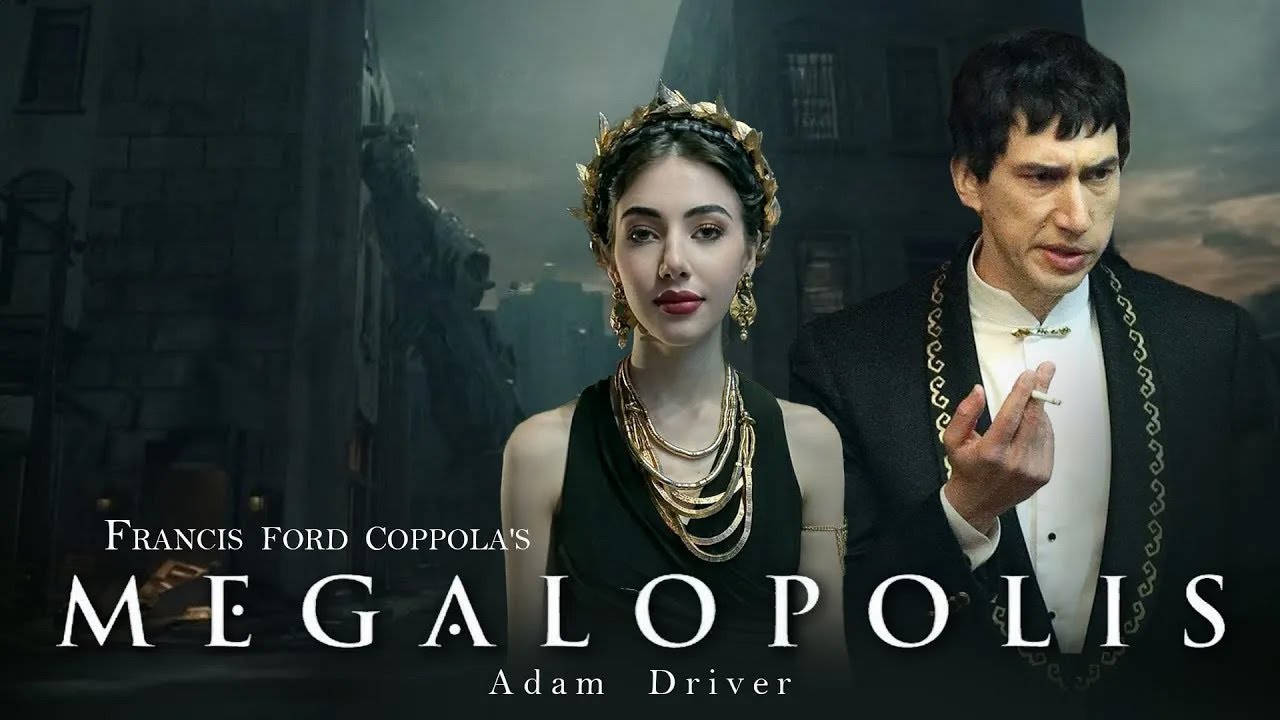*Megalopolis* (2024), directed by Francis Ford Coppola, is a monumental exploration of urban idealism and human conflict, blending classical and futuristic elements to create a visually stunning world. The film tells the story of Cesar, an ambitious architect determined to rebuild New York City as a utopia after a catastrophic disaster. The narrative sets up a striking battle between Cesar and Mayor Franklyn Cicero, a figure representing the old order who resists the utopian vision. In many ways, *Megalopolis* marks a bold return to Coppola’s auteur style, combining elements of political drama, architectural grandeur, and philosophical inquiry.
From a filmmaking perspective, *Megalopolis* stands as a technical achievement. The production design, a blend of CGI and practical sets, vividly portrays a city both ravaged by disaster and on the cusp of rebirth. Coppola's vision of New Rome fuses classical elements—such as towering, marble-like structures—with hyper-modern architecture, creating an environment where the past and the future are constantly in tension. The lighting and color palette reflect this thematic duality; bright, almost sterile lighting dominates the futuristic scenes, while darker, earthier tones are used for the older parts of the city, evoking a sense of decay and resistance to change.
One of the most impressive aspects of the film is its cinematography, led by Mihai Malaimare Jr., who has collaborated with Coppola on multiple projects, including *Tetro* (2009) and *Youth Without Youth* (2007). Malaimare’s use of long tracking shots and aerial views immerses the audience in the sprawling cityscape, giving the film a sense of scale and grandeur. His ability to capture both the intricacies of intimate dialogue scenes and the awe-inspiring vastness of the city is a testament to his mastery of the craft. The camera work is deliberate, often moving slowly to give the viewer time to absorb the immense detail in each frame, a characteristic reminiscent of Coppola’s work on films like *Apocalypse Now* (1979) and *The Godfather* trilogy.

The performances are another standout element of *Megalopolis*. Adam Driver plays Cesar, the visionary architect, with the intense focus and internal conflict he’s become known for in films like *Marriage Story* (2019) and *BlacKkKlansman* (2018). Driver’s portrayal of Cesar is layered, capturing both his idealism and the burdens of leadership. On the other side of the conflict is Mayor Franklyn Cicero, played by Laurence Fishburne, who brings a powerful presence to the role. Fishburne, known for his iconic performances in *The Matrix* trilogy and *Boyz n the Hood* (1991), embodies a man who represents the status quo, resistant to change and deeply entrenched in a system of greed and power.
The supporting cast is equally impressive. Nathalie Emmanuel, fresh off her role in *Fast X* (2023), plays a crucial role as Cesar's confidante and romantic interest, grounding his visionary tendencies with emotional intelligence. Shia LaBeouf, known for his often unpredictable but captivating performances in films like *Honey Boy* (2019) and *Fury* (2014), plays a key role as a volatile but talented urban planner, adding tension to the group dynamic. Aubrey Plaza, known for her unique mix of deadpan humor and intensity from roles in *Parks and Recreation* and *Black Bear* (2020), brings depth to her character as a city councilwoman caught between conflicting loyalties.
Coppola’s direction is as sharp and ambitious as ever. In *Megalopolis*, he revisits themes that have been present throughout his career—power, ambition, and the corrupting influence of politics. Much like Michael Corleone in *The Godfather*, Cesar is a man driven by vision but weighed down by the compromises he must make. Coppola gives the narrative ample room to explore these ideas, never rushing the complex interpersonal and political conflicts that arise. His pacing, though deliberate, allows for tension to build naturally, with key moments of action and revelation punctuating the otherwise slow burn of the film’s main plot.
Sound design and music play a subtle but essential role in reinforcing the film’s atmosphere. The score, composed by Coppola’s longtime collaborator, David Shire, mixes orchestral elements with futuristic, electronic tones. The music often swells at moments of architectural revelation or political confrontation, heightening the sense of grandeur and stakes. Sound effects, too, are meticulously crafted; the hum of the city, the clanking of construction, and the quieter moments of personal reflection all blend into the soundscape, grounding the viewer in the world Coppola has created.
From a narrative standpoint, *Megalopolis* is deeply philosophical. It’s not just a story about building a city—it’s a meditation on human progress, the cost of utopia, and the sacrifices necessary to achieve greatness. Cesar’s dream of a new city isn’t just about architecture; it’s about reshaping society. But Coppola is careful not to present utopia as an unalloyed good. The film raises questions about who gets to decide what’s best for society, and whether the pursuit of perfection inevitably leads to the marginalization of those who don’t fit into the vision. The conflict between Cesar and Cicero mirrors real-world political debates about progress versus tradition, making the film feel timely despite its futuristic setting.
In conclusion, *Megalopolis* is a technical and thematic triumph. Coppola’s return to large-scale filmmaking is marked by his signature blend of visual grandeur, complex characters, and philosophical inquiry. For those interested in the art of filmmaking, the movie offers a masterclass in production design, cinematography, and direction. It’s a film that not only asks big questions but also uses the full power of cinema to explore them. Whether you're drawn to its ambitious visual style, the powerhouse performances, or the deep political and philosophical themes, *Megalopolis* is a film that will leave a lasting impression.